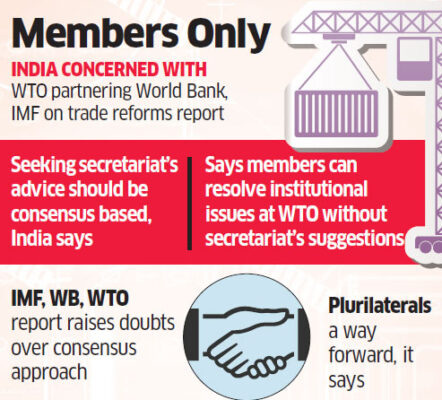- Home
- Prelims
- Mains
- Current Affairs
- Study Materials
- Test Series
Present an Indian perspective on reviving the World Trade Organization.
The Marrakesh Agreement of 1994, officially established World Trade Organization(WTO) regime to regulate the international trade effectively and further create an international free market. It included six framework agreements - Trade Related Investment Measures(TRIMS), General agreement on Trade in Services(GATS), Trade related aspects of Intellectual property rights(TRIPS), Dispute Settlement Understanding (DSU) and Trade Policy review Mechanism(TPRM).
However, over the years the negotiations under WTO have suffered various blocks.
Various challenges that WTO faces today:
 Various Reforms required in this regard:
Various Reforms required in this regard:
-
- No solution to the public stockholding for food security purposes: This is of paramount concern for developing countries like India that use Minimum Support Price (MSP)-backed mechanisms to procure foodgrains. The WTO rules allow countries to procure, stock and distribute food, subject to an overall cap, if such procurement is done at market distorting prices.
- Disagreement on Trade-Related Aspects of Intellectual Property Rights (TRIPS) agreement waiver COVID-19 related medical products. In 2020, India and South Africa proposed a TRIPS waiver to overcome intellectual property (IP)-related obstacles in increasing accessibility of COVID-19 medical products, including vaccines.
- Regulating irrational subsidies provided for fishing that has led to the overexploitation of marine resources by countries like China, which is the largest catcher and exporter of fish. However, this agreement should strike a balance between conserving ocean resources and the livelihood concerns of millions of marginal fishermen.
- Emergence of mega plurilateral trade agreements like the Comprehensive and Progressive Agreement for Trans-Pacific Partnership (CPTPP), Regional Comprehensive Economic Partnership (RCEP).
- These agreements fragment the global governance on international trade.
- They also push the multilateral order to the margin, converting the WTO to what some call an “institutional zombie”.
- Most plurilateral trade agreements ignore the needs of developing nations, shifting them to margins.
- E-Commerce Issue: A plurilateral Joint Statement Initiative(JSI) on e-commerce, spearheaded by Australia, Japan, and Singapore and joined by 71 members, was initiated in 2017. India and South Africa have led the resistance and been the most vocal critics. India largely presents coherent legal argumentation against the JSI and a long-term developmental vision. There is a risk of monopoly by the e-commerce giants of the world.
- Export subsidies: the developing world provides export subsidies on manufactured products and the developed world on Agricultural products. Both of which are a bone of contention.
 Various Reforms required in this regard:
Various Reforms required in this regard:
-
- Allowing public Stockholding: to fulfil the survival needs of the marginal farmers in the developing world.
- Intellectual Property: The WTO needs to adopt a waiver for the development of critical drugs through compulsory Licencing(CL) mechanism.
- Regarding fishing: An effective special and differential treatment (S&DT)provision that accords adequate policy space is what India and other developing countries should insist on.
- Negotiation of Single Multilateral agreement: All agreements in the world must compulsorily be agreed within the WTO forum instead of outside.
- E-commerce: The Needs of the developing world in the subjects of data localization and digital monopolies must be addressed and they must be adequately protected according to special and differential treatment (S&DT) provisions.
- Export subsidies: Again S&DT provision must be provided and such market distorting measures should be removed as early as possible.









 Latest News
Latest News
 General Studies
General Studies